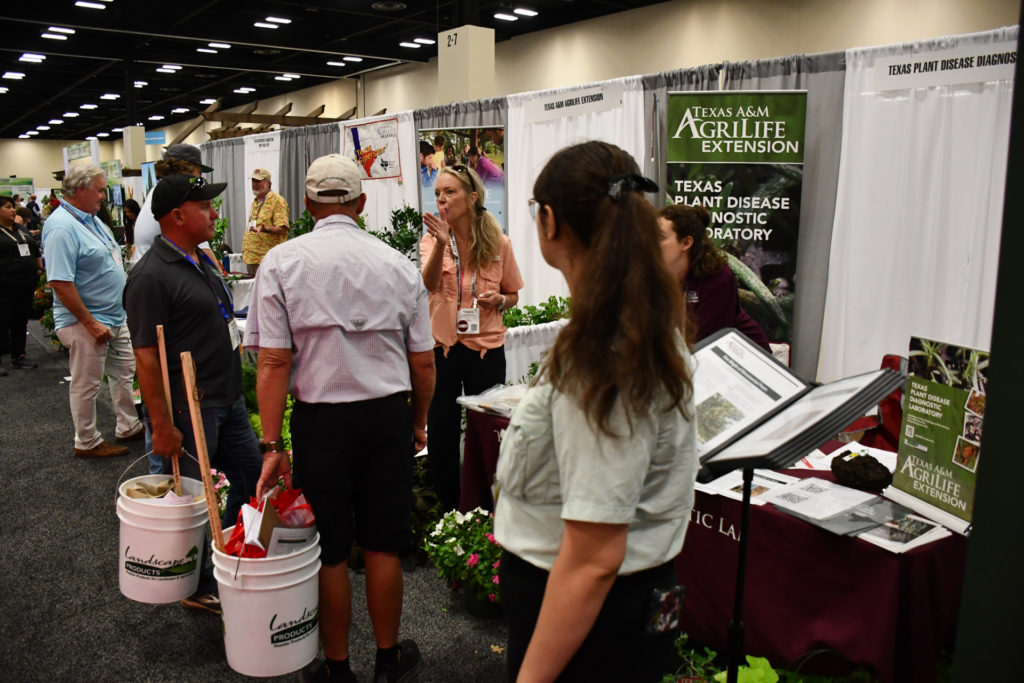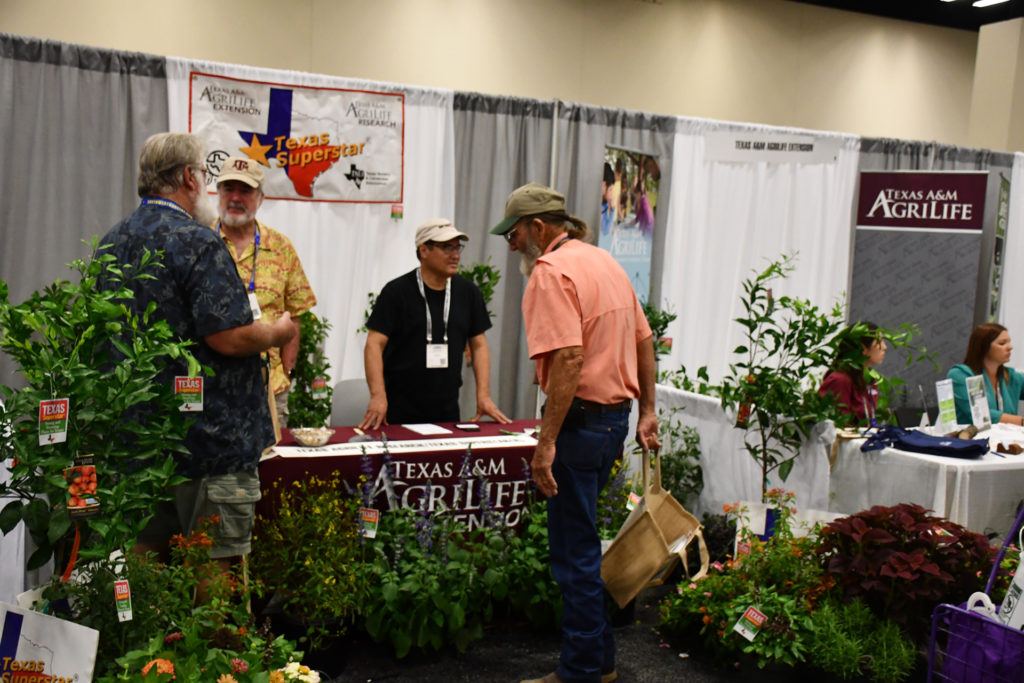Texas A&M AgriLife expands offerings at nursery/landscaping expo
Horticultural educational, service opportunities and ‘Texas Superstar’ selections featured
This year, Texas A&M AgriLife further expanded its educational, service and outreach presence at the Texas Nursery and Landscaping Association’s Nursery/Landscape Expo in San Antonio.

“This expo is where buyers and sellers from the green industry come together to meet face-to-face, discover new trends and grow their business,” said Larry Stein, Ph.D., Texas A&M AgriLife Extension Service horticulturist based at the Texas A&M AgriLife Research and Extension Center in Uvalde. “It is also where many in the green industry come for informational and educational opportunities, and this is where Texas A&M AgriLife really provides a service to that industry.”
Stein said the Texas Nursery and Landscaping Association, TNLA, offers Texas A&M AgriLife the opportunity to provide educational materials and horticultural expertise at the expo.
“We’ve participated in many of these expos in different cities through the years and always try to enhance our educational and informational offerings,” Stein said.
Educational, informational offerings
This year, Texas A&M AgriLife booths for its Department of Horticultural Sciences, Texas Plant Disease Diagnostic Laboratory, Department of Plant Pathology and Microbiology, AgriLife Extension and AgriLife Learn provided a variety of horticulture-related education, outreach and service opportunities. Its Texas Superstar booth allowed attendees to view various plants that have received the Texas Superstar designation.
“This expo provides a great networking opportunity for people in the green industry,” said Amit Dhingra, Ph.D., head of the Department of Horticultural Sciences in Texas A&M’s College of Agriculture and Life Sciences. “It is also a great opportunity for us to build awareness of our department, reach out to young people interested in the green industry and reconnect with former students who are now employed in the industry.”
Dhingra and other horticultural sciences department personnel at the booth also reminded attendees of the revived Horticultural Sciences Tailgate set for Sept. 17 on the Texas A&M campus and the department’s ongoing pecan sale.
“We’re also taking the opportunity to focus on possible internship opportunities for students and networking to connect students and industry,” said Tammy Neel, program coordinator for high-impact experiential learning in the Department of Horticultural Sciences. “It’s important to make people aware of the many career opportunities in horticulture, such as landscaper, floral designer, nursery manager, research scientist, winemaker and more.”
Attendees also were exposed to the extensive print and digital educational materials and opportunities available through AgriLife Learn as part of Texas A&M AgriLife’s outreach at the expo, said Casey Matzke, AgriLife Extension educational product specialist.
“While most of the materials we are focusing on during the expo are horticulture-related, we have publications and educational materials on a wide variety of topics, including health and wellness, child care, gardening, livestock, food safety, agriculture, natural resources and others,” Matzke said.
Many AgriLife Learn resources are free or at a nominal cost, and many are also available in Spanish.
Plant disease diagnostics
Texas A&M AgriLife also lets attendees know about information and services through its Texas Plant Disease Diagnostic Laboratory and the Department of Plant Pathology and Microbiology.
“We are letting people know about our lab and the services we can provide as well as what the department has to offer,” said Kevin Ong, Ph.D., professor and associate department head for AgriLife Extension with the Department of Plant Pathology and Microbiology. “Plant disease is a problem throughout Texas, and some of it has been exacerbated by the extended drought we’ve been experiencing. We help people identify plant diseases so they can know what they are dealing with and so that a remedy, if it exists, can be used successfully and effectively.”
Shelia McBride, lead diagnostician at the lab, noted that drought has particularly impacted instances of native elm wilt and leaf scalding in different plants.
“We have had a lot of interest in plant disease diagnoses ever since the first phase of the COVID outbreak,” McBride said. “People stayed home more and paid more attention to their surroundings, including their landscape.”
Lab personnel shared fact sheets about plant diseases with the expo audience at the booth, including new fact sheets on wilt diseases of elms in Texas, plum leaf scald and laurel wilt. All these resources are available on the AgriLife Learn site.
Texas Superstars
A unique and eye-catching addition to this year’s expo was the Texas Superstar display, said David Rodriguez, AgriLife Extension horticulturist for Bexar County.

Some Texas Superstar plants displayed at the expo included Gold Star Esperanza, Mexican Bird of Paradise, blue plumbago, New Gold Lantana, fall zinnia and Tycoon tomato.
“Texas Superstar is a designation of AgriLife Research and AgriLife Extension, and plants are chosen after extensive field testing by these agencies,” Rodriguez explained. “They are chosen for their attractiveness and ability to thrive in various Texas weather conditions. We also choose plants we feel confident will be available in sufficient supply to meet consumer demand.”
Rodriguez also noted the addition of Texas Superstars to the Texas green industry has helped fill a vital consumer niche and provided an additional source of revenue for commercial nurseries and landscapers.
“Due to the drought, more people are interested in native and adaptive plants that are more heat tolerant and require less water, and many Texas Superstar plants fit the bill,” he said.


